Olympe de Gouges
Olympe de Gouges (French: [olɛ̃p də ɡuʒ] (![]()
Olympe de Gouges | |
|---|---|
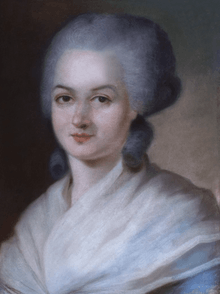 Late-18th century portrait of Gouges by Alexander Kucharsky | |
| Born | 7 May 1748 Montauban, Guyenne-and-Gascony, Kingdom of France |
| Died | 3 November 1793 (aged 45) |
| Cause of death | Execution by guillotine |
| Occupation | Activist, abolitionist, Women's rights advocate, playwright |
| Spouse(s) | Louis Aubry (m. 1765; died 1766) |
| Children | General Pierre Aubry de Gouges |
| Signature | |
She began her career as a playwright in the early 1780s. As political tension rose in France, Olympe de Gouges became increasingly politically engaged. She became an outspoken advocate against the slave trade in the French colonies in 1788. At the same time, she began writing political pamphlets. Today she is perhaps best known as an early women's rights advocate who demanded that French women be given the same rights as French men. In her Declaration of the Rights of Woman and the Female Citizen (1791), she challenged the practice of male authority and the notion of male-female inequality. She was executed by guillotine during the Reign of Terror (1793–1794) for attacking the regime of the Revolutionary government and for her association with the Girondists.
Biography

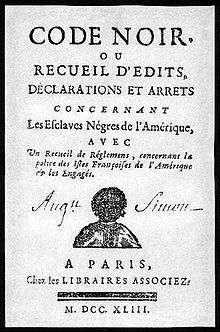
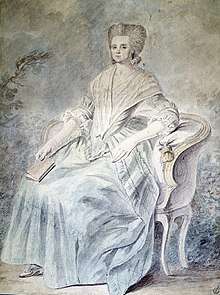
Marie Gouze was born into a petit bourgeois family in 1748 in Montauban, Quercy (in the present-day department of Tarn-et-Garonne), in southwestern France. She believed that she was the illegitimate daughter of Jean-Jacques Lefranc, Marquis de Pompignan.[1] Her mother afforded her a bourgeois education.[2]
In 1765 aged 16 she was married against her will to Louis Aubry, a caterer. Gouges said in a semi-autobiographical novel (Mémoire de Madame de Valmont contre la famille de Flaucourt), "I was married to a man I did not love and who was neither rich nor well-born. I was sacrificed for no reason that could make up for the repugnance I felt for this man."[3] Her husband died a year later, and in 1770 she moved to Paris with her son to live with her sister. She never married again, calling the institution of marriage "the tomb of trust and love".[2]
In Paris she started a relationship with the wealthy Jacques Biétrix de Rozières, but refused his marriage proposal. She remained close to Rozières throughout the French Revolution. With the support of Rozières she established a theatre company.[2] Gouges attended the artistic and philosophical salons of Paris, where she met many writers, including La Harpe, Mercier, and Chamfort, as well as future politicians such as Brissot and Condorcet. She usually was invited to the salons of Madame de Montesson and the Comtesse de Beauharnais, who also were playwrights. She also was associated with Masonic Lodges, among them the Loge des Neuf Sœurs that was created by her friend Michel de Cubières.
In 1788 she published Réflexions sur les hommes nègres, which demanded compassion for the plight of slaves in the French colonies.[4] For Gouges there was a direct link between the autocratic monarchy in France and the institution of slavery, she argued that "Men everywhere are equal… Kings who are just do not want slaves; they know that they have submissive subjects".[5] She came to the public's attention with the play l'Esclavage des Noirs, which was staged at the famous Comédie-Française in 1785. Her stance against the slavery in the French colonies made her the target of threats.[2] Gouges was also attacked by those who thought that a woman's proper place was not in the theatre. The influential Abraham-Joseph Bénard remarked "Mme de Gouges is one of those women to whom one feels like giving razor blades as a present, who through their pretensions lose the charming qualities of their sex... Every woman author is in a false position, regardless of her talent". Gouges was defiant, she wrote "I'm determined to be a success, and I'll do it in spite of my enemies." The slave trade lobby had mounted a press campaign against her play and she eventually took legal action, forcing Comédie-Française to stage l'Esclavage des Noirs. But the play closed after three performances; the lobby had paid hecklers to sabotage the performances.[6]
A passionate advocate of human rights, Gouges greeted the outbreak of the Revolution with hope and joy, but soon became disenchanted when égalité (equal rights) was not extended to women. In 1791 Gouges became part of the Society of the Friends of Truth, also called the "Social Club," an association with the goal of equal political and legal rights for women. Members sometimes gathered at the home of the well-known women's rights advocate, Sophie de Condorcet. In 1791, in response to the Declaration of the Rights of Man and of the Citizen, she wrote the Déclaration des droits de la Femme et de la Citoyenne ("Declaration of the Rights of Woman and the Female Citizen"). In that pamphlet she expressed, for the first time, her famous statement:
"A woman has the right to mount the scaffold. She must possess equally the right to mount the speaker's platform."[7]
This was followed by her Contrat Social ("Social Contract," named after a famous work of Jean-Jacques Rousseau), proposing marriage based upon gender equality.[7]
In 1790 and 1791, in the French colony of Saint-Domingue (present-day Haiti), free people of colour and African slaves revolted in response to the ideals expressed in the Declaration of the Rights of Man and of the Citizen.[8] Gouges did not approve of violent revolution, and published l'Esclavage des Noirs with a preface in 1792, arguing that the slaves and the free people who responded to the horrors of slavery with "barbaric and atrocious torture" in turn justified the behaviour of the tyrants. In Paris Gouges was accused of having incited the insurrection in Saint-Domingue with the play. When it was staged again in December 1792 a riot erupted in Paris.[9]
Gouges opposed the execution of Louis XVI of France (which took place on 21 January 1793), partly out of opposition to capital punishment and partly because she favored constitutional monarchy. This earned her the ire of many hard-line republicans, even into the next generation—such as the 19th-century historian Jules Michelet, a fierce apologist for the Revolution, who wrote, "She allowed herself to act and write about more than one affair that her weak head did not understand."[10] Michelet opposed any political participation by women and thus disliked Gouges.[11] In December 1792, when Louis XVI was about to be put on trial, she wrote to the National Assembly offering to defend him, causing outrage among many deputies. In her letter she argued that he had been duped–that he was guilty as a king, but innocent as a man, and that he should be exiled rather than executed.[12]
Gouges was associated with the Gironde party, who like her favoured a constitutional monarchy. After the execution of Louis XVI she became wary of Robespierre's Montagnard faction and in open letters criticised their violence and summary assassinations.[13]
Arrest and execution
._British_Library_443.a.3(7).jpg)

As the Revolution progressed, she became more and more vehement in her writings. On 2 June 1793, the Jacobins arrested prominent Girondins, imprisoned them, and sent them to the guillotine in October. Finally, her poster Les trois urnes, ou le salut de la Patrie, par un voyageur aérien ("The Three Urns, or the Salvation of the Fatherland, by an Aerial Traveller") of 1793, led to her arrest. That piece demanded a plebiscite for a choice among three potential forms of government: the first, a unitary republic, the second, a federalist government, or the third, a constitutional monarchy. The problem was that law of the revolution made it a capital offense for anyone to publish a book or pamphlet that encouraged reestablishing the monarchy.[14]
After her arrest, the commissioners searched her house for evidence. When they could not find any in her home, she voluntarily led them to the storehouse where she kept her papers. It was there that the commissioners found an unfinished play titled La France Sauvée ou le Tyran Détroné ("France Preserved, or The Tyrant Dethroned"). In the first act (only the first act and a half remain), Marie-Antoinette is planning defence strategies to retain the crumbling monarchy and is confronted by revolutionary forces, including Gouges herself. The first act ends with Gouges reproving the queen for having seditious intentions and lecturing her about how she should lead her people. Both Gouges and her prosecutor used this play as evidence in her trial. The prosecutor claimed that Gouges' depictions of the queen threatened to stir up sympathy and support for the Royalists, whereas Gouges stated that the play showed that she had always been a supporter of the Revolution.[15]
She spent three months in jail without an attorney, trying to defend herself. The presiding judge denied Gouges her legal right to a lawyer on the grounds that she was more than capable of representing herself. It seems as though the judge based this argument on Gouges' tendency to represent herself in her writings.[15] Through her friends, she managed to publish two texts: Olympe de Gouges au tribunal révolutionnaire ("Olympe de Gouges at the Revolutionary tribunal"), in which she related her interrogations; and her last work, Une patriote persécutée ("A [female] patriot persecuted"), in which she condemned the Terror.[15]
Her son Pierre Aubry was suspended from his office as vice-general and head of battalion after her arrest. Gouges had acquired the position for him by paying 1,500 livres.[16] On 2 November 1793 she wrote to him: "I die, my dear son, a victim of my idolatry for the fatherland and for the people. Under the specious mask of republicanism, her enemies have brought me remorselessly to the scaffold."[17]
On 3 November 1793 the Jacobins sentenced her to death and executed her for seditious behaviour and for attempting to reinstate the monarchy.[18] Olympe was executed only a month after Condorcet had been proscribed, and just three days after the Girondin leaders had been guillotined. Her body was disposed of in the Madeleine Cemetery.[19] Olympe's last moments were depicted by an anonymous Parisian who kept a chronicle of events:
"Yesterday, at seven o'clock in the evening, a most extraordinary person called Olympe de Gouges who held the imposing title of woman of letters, was taken to the scaffold, while all of Paris, while admiring her beauty, knew that she didn't even know her alphabet.... She approached the scaffold with a calm and serene expression on her face, and forced the guillotine's furies, which had driven her to this place of torture, to admit that such courage and beauty had never been seen before.... That woman... had thrown herself in the Revolution, body and soul. But having quickly perceived how atrocious the system adopted by the Jacobins was, she chose to retrace her steps. She attempted to unmask the villains through the literary productions which she had printed and put up. They never forgave her, and she paid for her carelessness with her head."[20]
Political legacy
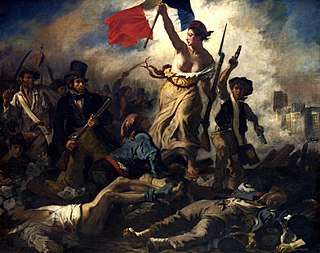
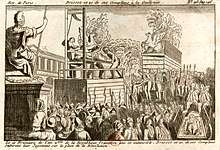

Her execution was used as a warning to other politically active women. At the 15 November 1793 meeting of the Commune, Pierre Gaspard Chaumette cautioned a group of women wearing Phrygian bonnets, reminding them of "the impudent Olympe de Gouges, who was the first woman to start up women's political clubs, who abandoned the cares of her home, to meddle in the affairs of the Republic, and whose head fell under avenging blade of the law". This posthumous characterisation of Gouges by the political establishment was misleading, as Gouges had no role in founding the Society of Revolutionary Republican Women. In her political writings Gouges had not called for women to abandon their homes, but she was cast by the politicians as an enemy of the natural order, and thus enemy of the ruling Jacobin party. Paradoxically, the two women who had started the Society of Revolutionary Republican Women, Claire Lacombe and Pauline Léon were not executed.[22] Lacombe, Léon and Theroigne de Mericourt had spoken at women's and mixed clubs, and the Assemblée, while Gouges had shown a reluctance to engage in public speaking, but prolifically published pamphlets.[23] However, Chaumette was a staunch opponent of the Girondins, and had characterised Gouges as unnatural and unrepublican prior to her execution.[24]
1793 has been described as a watershed for the construction of women's place in revolutionary France, and the deconstruction of the Girondins' Marianne. That year a number of women with a public role in politics were executed, including Madame Roland and Marie-Antoinette. The new Républicaine was the republican mother that nurtured the new citizen. While politically active women were executed the Convention banned all women's political associations.[25] 1793 marked the start of the Reign of Terror in post-revolutionary France, where thousands of people were executed. Across the Atlantic world observers of the French Revolution were shocked, but the ideals of liberté, égalité, fraternité had taken a life of their own.[26]
Gouges' Declaration of the Rights of Woman and the Female Citizen had been widely reproduced and influenced the writings of women's advocates in the Atlantic world.[27] One year after its publication, in 1792, the keen observer of the French Revolution Mary Wollstonecraft published Vindication of the Rights of Woman.[28] Writings on women and their lack of rights became widely available. The experience of French women during the revolution entered the collective consciousness. The anti-imperial Irish Rebellion of 1798 was whipped up by Anglo-Irish women such as Maria Edgeworth, but the quest of Catholics for political rights was brutally suppressed by the British military.[29]
American women began to refer to themselves as citess or citizeness and took to the streets to achieve equality and freedom.[30] The same year Gouges was executed the pamphlet On the Marriage of Two Celebrated Widows was published anonymously, proclaiming that "two celebrated widows, ladies of America and France, after having repudiated their husbands on account of their ill treatment, conceived of the design of living together in the strictest union and friendship."[31] Revolutionary novels were published that put women at the centre of violent struggle, such as the narratives written by Helen Maria Williams and Leonora Sansay.[30] At the 1848 Women's Rights Convention at Seneca Falls, the rhetorical style of the Declaration of the Rights of Woman and the Female Citizen was employed to paraphrase the Declaration of Independence into the Declaration of Sentiments,[32] which demanded women’s' right to vote.[33]
After her execution her son Pierre Aubry signed a letter, denying his endorsement for her political legacy.[34] He tried to change her name in the records, to Marie Aubry, but the name she had given herself has endured.[35] Although she was a celebrity in her lifetime and a prolific author, Gouges became largely forgotten, but then rediscovered through a political biography by Olivier Blanc in the mid 1980s.[36]
On 6 March 2004, the junction of the Rues Béranger, Charlot, de Turenne, and de Franche-Comté in Paris was proclaimed the Place Olympe de Gouges. The square was inaugurated by the mayor of the 3rd arrondissement, Pierre Aidenbaum, along with then first deputy mayor of Paris, Anne Hidalgo. The actress Véronique Genest read an excerpt from the Declaration of the Rights of Woman. 2007 French presidential contender Ségolène Royal expressed the wish that Gouges' remains be moved to the Panthéon. However, her remains—like those of the other victims of the Reign of Terror—have been lost through burial in communal graves, so any reburial (like that of Marquis de Condorcet) would be only ceremonial.
She is honoured in many street names across France, in the Salle Olympe de Gouges exhibition hall in rue Merlin, Paris, and the Parc Olympe de Gouges in Annemasse.
Plays and writings
Born Marie Gouze she first adopted the name Olympe de Gouges for her early plays. As a woman from the province and of lowly birth she fashioned herself to fit in with the Paris establishment.[37] Gouges signed her public letters with citoyenne, the feminised version of citizen. In pre-revolutionary France there were no citizens, an author was the subject of the king. But in revolutionary France there were only citoyen. It was only in October 1792 that the Convention decreed the use of citoyenne to replace Madame and Mademoiselle.[38]
Pre-revolutionary plays
Gouges penned more than 30 plays, often with a socially critical theme. A number of her plays were published and some are extant. A record of her papers which were seized in 1793, at the time of her execution, lists about 40 plays.[39] Among other themes she wrote plays on the slave trade, divorce, marriage, debtors' prisons, children's rights, and government work schemes for the unemployed. As a playwright she charged into the contemporary political controversies and she was often in the vanguard.[40] Her 1788 pamphlet Reflections on blacks and the play l'Esclavage des Noirs on the slave trade made her, alongside Marquis de Condorcet, one of France's earliest public opponents of slavery.[40] In the final act of l'Esclavage des Noirs Gouges lets the French colonial master, not the slave, utter a prayer for freedom: "Let our common rejoicings be a happy portent of liberty". She drew a parallel between colonial slavery and political oppression in France. One of the slave protagonist explains that the French must gain their own freedom, before they can deal with slavery. Gouges also openly attacked the notion that human rights were a reality in revolutionary France. The slave protagonist comments on the situation in France "The power of one Master alone is in the hands of a thousand Tyrants who trample the People under foot. The People will one day burst their chains and will claim all its rights under Natural law. It will teach the Tyrants just what a people united by long oppression and enlightened by sound philosophy can do". While it was common in France to equate political oppression to slavery, this was an analogy and not an abolitionist sentiment.[41]
Manifestos
In November 1788 she published her first political brochure, a manifesto entitled Letter to the people, or project for a patriotic fund. In early 1789 she published Patriotic remarks setting out her proposals for social security, care for the elderly, institutions for homeless children, hostels for unemployed, and the introduction of a jury system. She also called upon women to "shake off the yoke of shameful slavery". The same year she wrote a series of pamphlets on a range of social concerns, such as illegitimate children. In these pamphlets she advanced the public debate on issues that would later be picked up by feminists, such as Flora Tristan. She continued to publish political essays between 1788 and 1791. Such as Cry of the wise man, by a woman in response to Louis XVI calling together the Estates-General.[42]
Women's rights

Gouges wrote her famous Declaration of the Rights of Woman and the Female Citizen shortly after the French Constitution of 1791 was ratified by King Louis XVI, and dedicated it to his wife, Queen Marie Antoinette. The French Constitution marked the birth of the short-lived constitutional monarchy and implemented a status based citizenship. Citizens were defined as men over 25, were "independent" and had paid the poll tax. These citizens had the right to vote. Furthermore active citizenship was two-tiered, with those who could vote and those who were fit for public office. Women were by definition not afforded any rights of active citizenship. Like men who could not pay the poll tax, children, domestic servants, rural day-laborers and slaves, Jews, actors and hangmen, women had no political rights. In transferring sovereignty to the nation the constitution dismantled the old regime, but Gouges argued that it did not go far enough.[43]
Gouges was not the only feminists who attempted to influence the political structures of late Enlightenment France. But like the writings of Etta Palm d'Aelders, Theroigne de Mericourt, Claire Lacombe and Marquis de Condorcet, her arguments fell on deaf ears. At the end of the 18th century influential political actors such as Honoré Gabriel Riqueti, Charles Maurice de Talleyrand-Périgord and Emmanuel Joseph Sieyès were not convinced of the case for equality.[44]
Letters and pamphlets

In her early political letters Gouges made a point of being a woman, and that she spoke "as a woman". She addressed her public letters, published often as pamphlets, to statesmen such as Jacques Necker, the Duke of Orléans, or the queen Marie-Antoinette. Like other pamphlet writers in revolutionary France, she spoke from the margins and spoke of her experience as a citizen, with a desire to influence the ongoing public debate. In her letters she articulated the values of the Enlightenment, and commented on how they may be put into practice, such as civic virtue, universal rights, natural rights and political rights. In language and practice this was a debate among men and about men. Republicans discussed civic virtue in terms of patriotic manliness (la vertu mâle et répub-licaine). Women were not granted political rights in revolutionary France, thus Gouges used her pamphlets to enter the public debate and she argued that the debate needed to include the female civic voice.[38]
Gouges signed her pamphlets with citoyenne. It has been suggested that she adopted this notion from Rousseau's letter To the Republic of Geneva, where he speaks directly to two types of Genevans: the "dear fellow citizens" or his "brothers", and the aimables et virtueeses Citoyenne, that is the women citizens. In the public letter Remarques Patriotique from December 1788 Gouges justified why she is publishing her political thoughts, arguing that "This dream, strange though it may seem, will show the nation a truly civic heart, a spirit that is always concerned with the public good".[45]
As the politics of revolutionary France changed and progressed Gouges failed to become an actor on the political stage, but in her letters offered advice to the political establishment. Her proposition for a political order remained largely unchanged. She expresses faith in the Estates General and in reference to the estates of the realm, that the people of France (Third Estate) would be able to ensure harmony between the three estates, that is clergy, nobility and the people. Despite this she expresses loyalty for the ministers Jacques Necker and Charles Alexandre de Calonne. Gouges opposes absolutism, but believed France should retain a constitutional monarchy.[46]
In her open letter to Marie-Antoinette, Gouges declared:
"I could never convince myself that a princess, raised in the midst of grandeur, had all the vices of baseness... Madame, may a nobler function characterize you, excite your ambition, and fix your attention. Only one whom chance had elevated to an eminent position can assume the task of lending weight to the progress of the Rights of Woman and of hastening its success. If you were less well informed, Madame, I might fear that your individual interests would outweigh those of your sex. You love glory; think, Madame, the greatest crimes immortalize one as much as the greatest virtues, but what a different fame in the annals of history! The one is ceaselessly taken as an example, and the other is eternally the execration of the human race."[47]
Public letters, or pamphlets, were the primary means for the working class and women writers to engage in the public debate of revolutionary France. The intention was not to court the favour of the addressee, often a public figure. Frequently these pamphlets were intended to stir up public anger. They were widely circulated within and outside France. Gouges' contemporary Madame Roland of the Gironde party became notorious for her Letter to Louis XVI in 1792. In the same year Gouges penned Letter to Citizen Robespierre, which Robespierre refused to answer. Gouges took to the street, and on behalf of the French people proclaimed "Let us plunge into the Seine! Thou hast need of a bath... thy death will claim things, and as for myself, the sacrifice of a pure life will disarm the heavens."[48]
Plays listed
- Le Mariage inattendu de Chérubin (The Unexpected Marriage of Cherubin) 1786
- L’Homme généreux (The Generous Man) 1786
- Le Philosophe corrigé ou le cocu supposé (The Corrected Philosopher or the Supposed Cuckold) 1787
- Zamore et Mirza, ou l’heureux naufrage (Zamore and Mirza, or the Happy Shipwreck) 1784
- Molière chez Ninon, ou le siècle des grands hommes (Molière at Ninon, or the Century of Great Men) 1788
- Bienfaisance, ou la bonne mère (Beneficence, or the Good Mother) 1788
- Le Marché des Noirs (The Black Market) 1790
- Le Nouveau Tartuffe, ou l’école des jeunes gens (The New Tartuffe, or the School for the Young) 1790
- Les Démocrates et les aristocrates (The Democrats and the Aristocrats) 1790
- La Nécessité du divorce (The Necessity of Divorce) 1790
- Le Couvent'’ (The Convent) 1790
- Mirabeau aux Champs Élysées (Mirabeau at the Champs Élysées) 1791
- L’Esclavage des Noirs, ou l’heureux naufrage (The Slavery of the Blacks, or the Happy Shipwreck) 1792
- La France sauvée, ou le tyran détrôné (France saved, or the Dethroned Tyrant) 1792
- L’Entrée de Dumouriez à Bruxelles (The Entrance of Dumouriez in Brussels) 1793
See also
- The Women's March on Versailles
- Women's Petition to the National Assembly
- List of civil rights leaders
- List of women's rights activists
References
- Paul, Pauline (2 June 1989). "I Foresaw it All: The Amazing Life and Oeuvre of Olympe de Gouges". Die Zeit. Translated by Kai Artur Diers. (also see Olympe de Gouges, a Daughter of Quercy on her Way to the Panthéon Archived 19 October 2004 at the Wayback Machine on Quercy.net)
- Lisa L. Moore, Joanna Brooks & Caroline Wigginton (2012). Transatlantic Feminisms in the Age of Revolutions. Oxford University Press. p. 245. ISBN 978-0199743483.CS1 maint: uses authors parameter (link)
- Noack, Paul (1992). Olympe de Gouges, 1748–1793: Kurtisane und Kampferin für die Rechte der Frau [Olympe de Gouges, 1748–1793: Courtesan and Activist for Women's Rights] (in German). Deutscher Taschenbuch Verlag. p. 31. ISBN 978-3-423-30319-4.
- Erica Harth (1992). Cartesian Women: Versions and Subversions of Rational Discourse in the Old Regime. Cornell University Press. p. 227. ISBN 978-0801499982.
- Erica Harth (1992). Cartesian Women: Versions and Subversions of Rational Discourse in the Old Regime. Cornell University Press. p. 229. ISBN 978-0801499982.
- Mary Seidman Trouille (1997). Sexual Politics in the Enlightenment: Women Writers Read Rousseau. SUNY Press. p. 272. ISBN 978-0791434895.
- Chronicle of the French Revolution, Longman, 1989 p. 235
- Lisa L. Moore, Joanna Brooks & Caroline Wigginton (2012). Transatlantic Feminisms in the Age of Revolutions. Oxford University Press. p. 15. ISBN 978-0199743483.CS1 maint: uses authors parameter (link)
- Marlene L. Daut (2015). Tropics of Haiti: Race and the Literary History of the Haitian Revolution in the Atlantic World, 1789–1865. Oxford University Press. p. 248. ISBN 978-1781381847.
- J. Michelet, La Révolution Française.
- See Charles Monselet, Les Oubliés et les Dédaignés [The Forgotten and the Scorned]. See also Joan Scott in Rebel Daughters.
- Chronicle of the French Revolution, Longman 1989 p. 311
- Lisa L. Moore, Joanna Brooks & Caroline Wigginton (2012). Transatlantic Feminisms in the Age of Revolutions. Oxford University Press. p. 245. ISBN 978-0199743483.CS1 maint: uses authors parameter (link)
- Walsh, William Shepard. A Handy Book of Curious Information: Comprising Strange Happenings in the Life of Men and Animals, Odd Statistics, Extraordinary Phenomena, and Out of the Way Facts Concerning the Wonderlands of the Earth. J.P. Lippincott (1913). p. 834
- Vanpée, Janie (March 1999). "Performing Justice: The Trials of Olympe de Gouges". Theatre Journal. 51 (1): 47–65. doi:10.1353/tj.1999.0018. JSTOR 25068623.
- Jessica Goodman (2017). Commemorating Mirabeau: 'Mirabeau aux Champs-Elysées' and other texts. MHRA. p. 59. ISBN 978-1781882184.
- Ian L. Donnachie, Ian Donnachie & Carmen Lavin (2003). From Enlightenment to Romanticism: Anthology I. Manchester University Press. p. 94. ISBN 978-0719066719.CS1 maint: uses authors parameter (link)
- Beauchamps, Marie (2016). "Olympe de Gouges's trial and the affective politics of denaturalization in France". Citizenship Studies. 20 (8): 943–56. doi:10.1080/13621025.2016.1229195.
- Beyern, B., Guide des tombes d'hommes célèbres, Le Cherche Midi, 2008, 377 p, ISBN 978-2-7491-1350-0
- Mousset, Sophie (2007). Women's Rights and the French Revolution: A Biography of Olympe de Gouges. New Brunswick (US) & London: Transaction Publishers. p. 99. ISBN 978-0-7658-0345-0.
- "Brave new world – Women's rights". National Archives. Retrieved 15 January 2011.
- Annie Smart (2011). Citoyennes: Women and the Ideal of Citizenship in Eighteenth-Century France. University of Delaware. p. 144. ISBN 978-1611493559.
- Annie Smart (2011). Citoyennes: Women and the Ideal of Citizenship in Eighteenth-Century France. University of Delaware. p. 148. ISBN 978-1611493559.
- Annie Smart (2011). Citoyennes: Women and the Ideal of Citizenship in Eighteenth-Century France. University of Delaware. p. 150. ISBN 978-1611493559.
- Annie Smart (2011). Citoyennes: Women and the Ideal of Citizenship in Eighteenth-Century France. University of Delaware. p. 154. ISBN 978-1611493559.
- Lisa L. Moore, Joanna Brooks & Caroline Wigginton (2012). Transatlantic Feminisms in the Age of Revolutions. Oxford University Press. p. 14. ISBN 978-0199743483.CS1 maint: uses authors parameter (link)
- Ana M. Martínez Alemán & Kristen A. Renn (2002). Women in Higher Education: An Encyclopedia. ABC-CLIO. p. 34. ISBN 978-1576076149.CS1 maint: uses authors parameter (link)
- Ana M. Martínez Alemán & Kristen A. Renn (2002). Women in Higher Education: An Encyclopedia. ABC-CLIO. p. 35. ISBN 978-1576076149.CS1 maint: uses authors parameter (link)
- Lisa L. Moore, Joanna Brooks & Caroline Wigginton (2012). Transatlantic Feminisms in the Age of Revolutions. Oxford University Press. p. 15. ISBN 978-0199743483.CS1 maint: uses authors parameter (link)
- Lisa L. Moore, Joanna Brooks & Caroline Wigginton (2012). Transatlantic Feminisms in the Age of Revolutions. Oxford University Press. p. 16. ISBN 978-0199743483.CS1 maint: uses authors parameter (link)
- Lisa L. Moore, Joanna Brooks & Caroline Wigginton (2012). Transatlantic Feminisms in the Age of Revolutions. Oxford University Press. p. 297. ISBN 978-0199743483.CS1 maint: uses authors parameter (link)
- Ana M. Martínez Alemán & Kristen A. Renn (2002). Women in Higher Education: An Encyclopedia. ABC-CLIO. p. 37. ISBN 978-1576076149.CS1 maint: uses authors parameter (link)
- Ana M. Martínez Alemán & Kristen A. Renn (2002). Women in Higher Education: An Encyclopedia. ABC-CLIO. p. 38. ISBN 978-1576076149.CS1 maint: uses authors parameter (link)
- Jessica Goodman (2017). Commemorating Mirabeau: 'Mirabeau aux Champs-Elysées' and other texts. MHRA. p. 59. ISBN 978-1781882184.
- Jessica Goodman (2017). Commemorating Mirabeau: 'Mirabeau aux Champs-Elysées' and other texts. MHRA. p. 35. ISBN 978-1781882184.
- Mary Seidman Trouille (1997). Sexual Politics in the Enlightenment: Women Writers Read Rousseau. SUNY Press. p. 237. ISBN 978-0791434895.
- Annie Smart (2011). Citoyennes: Women and the Ideal of Citizenship in Eighteenth-Century France. University of Delaware. p. 121. ISBN 978-1611493559.
- Annie Smart (2011). Citoyennes: Women and the Ideal of Citizenship in Eighteenth-Century France. University of Delaware. p. 122. ISBN 978-1611493559.
- Sherman, C. Reading Olympe de Gouges. Palgrave Pivot; 2013 edition (31 May 2013) p. 51. ISBN 9781137346452
- David Williams (1999). The Enlightenment. Cambridge University Press. p. 317. ISBN 978-0521564908.
- Erica Harth (1992). Cartesian Women: Versions and Subversions of Rational Discourse in the Old Regime. Cornell University Press. p. 228. ISBN 978-0801499982.
- David Williams (1999). The Enlightenment. Cambridge University Press. p. 317. ISBN 978-0521564908.
- Annie Smart (2011). Citoyennes: Women and the Ideal of Citizenship in Eighteenth-Century France. University of Delaware. p. 134. ISBN 978-1611493559.
- David Williams (1999). The Enlightenment. Cambridge University Press. p. 38. ISBN 978-0521564908.
- Annie Smart (2011). Citoyennes: Women and the Ideal of Citizenship in Eighteenth-Century France. University of Delaware. p. 123. ISBN 978-1611493559.
- Annie Smart (2011). Citoyennes: Women and the Ideal of Citizenship in Eighteenth-Century France. University of Delaware. p. 123. ISBN 978-1611493559.
- Lisa L. Moore, Joanna Brooks & Caroline Wigginton (2012). Transatlantic Feminisms in the Age of Revolutions. Oxford University Press. p. 247. ISBN 978-0199743483.CS1 maint: uses authors parameter (link)
- Mary A. Favret (2005). Romantic Correspondence: Women, Politics and the Fiction of Letters. Cambridge University Press. pp. 114, 119. ISBN 978-0521604284.
External links
| Wikimedia Commons has media related to Olympe de Gouges. |
![]()
| Wikiquote has quotations related to: Olympe de Gouges |
- Olympe de Gouges on Data.bnf.fr
- A website containing English translations of de Gouges' works
- An extensive article about Olympe de Gouges
- An excerpt from the Declaration of the Rights of Woman and the Female Citizen
- Daniel Cazes (2007). Obras feministas de François Poulain de la Barre (1647–1723): estudio preliminar. UNAM. p. 36. ISBN 978-9703246137.
